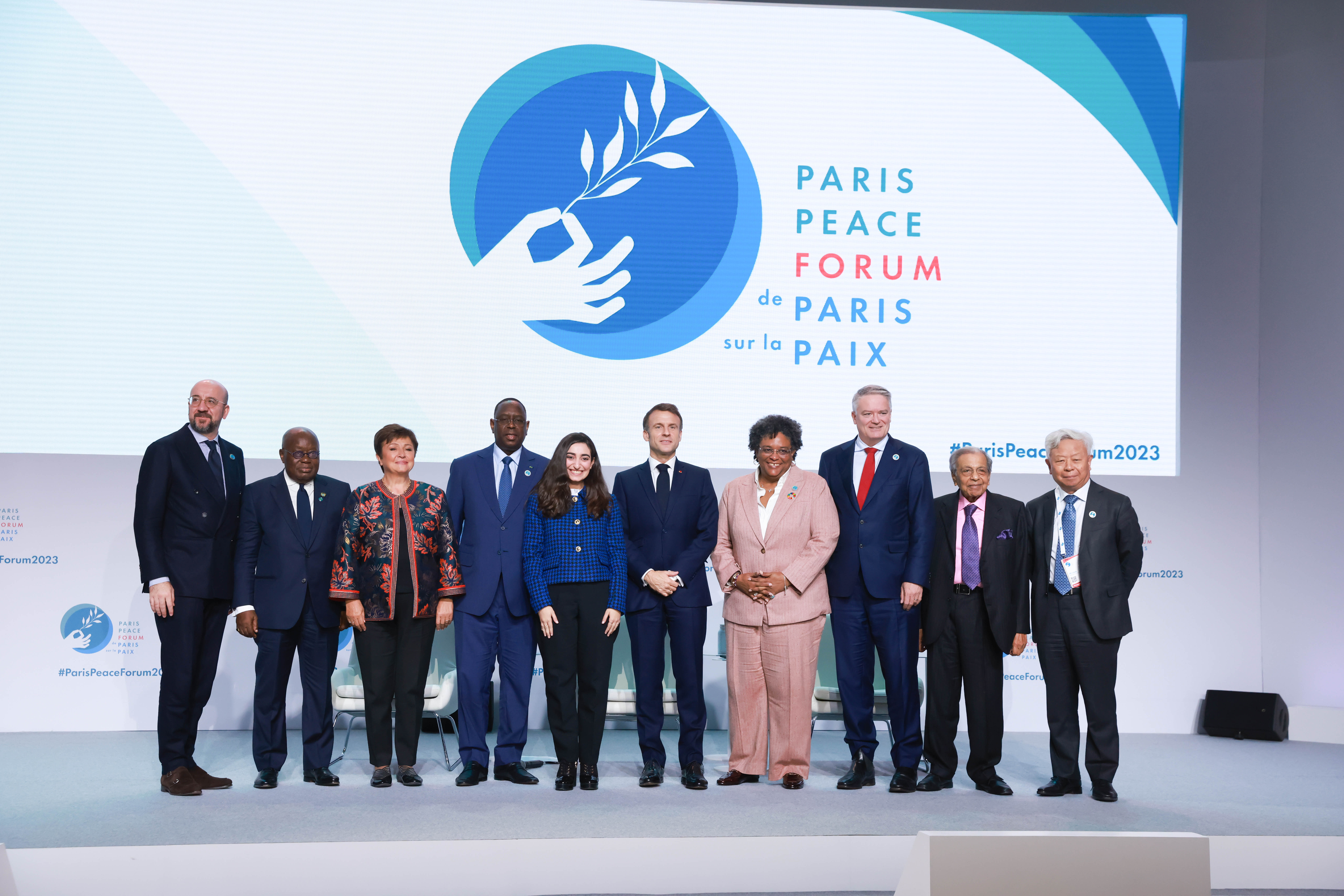
For the sixth year in a row, the Paris Peace Forum brought together key players in global governance on November 10-11 at the Palais Brongniart. The aim of the 2023 Forum was to "Seek Common Ground in a World of Rivalry", against a backdrop of global polarization (most notably between China and the United States) jeopardizing international cooperation on issues vital to humanity – all in an environment marked by the eruption of conflict in the Middle East.
“This year, the Paris Peace Forum offered a modest contribution to addressing the burning crises of today, even though this is primarily the role of States, diplomats, and the UN. Our fundamental mission is the prevention of tomorrow’s conflicts. Since its inception in 2018, the Forum has set itself the goal of building the foundations of peace in the long term, preparing a less chaotic and better regulated world to face the global challenges that threaten us. These are the issues on which the Forum can make a difference.”
Justin Vaïsse
Founder and Director General of the Paris Peace Forum
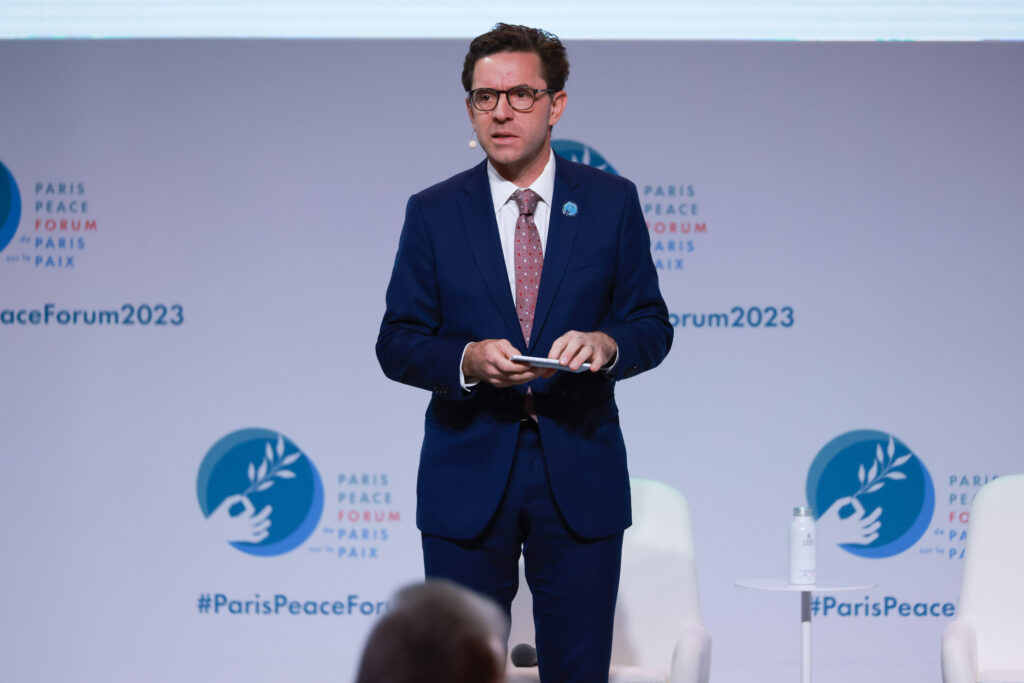
4200
Participants
70
High-level representatives
85
Panels and roundtables
400
Speakers
60
Projects showcased
This year’s edition provided a platform for dialogue on current conflicts. First, the Near East conflict, with the International Humanitarian Conference on Gaza held on November 9 as part of the Paris Peace Forum (1 billion euros in humanitarian funding announced) as well as a closed-door meeting between Middle Eastern players at the Palais Brongniart. There was also engagement on the conflict in Ukraine, with the remote participation of Ukrainian President Volodymyr Zelensky and the remarkable interview with Oleksandra Matviichuk, the 2022 Nobel Peace Prize winner.
Other working sessions on conflicts provided an opportunity to exchange views on pressures against the humanitarian law (“Stopping the war on the rules of war”) and the challenges facing international justice, including a presentation by Karim Khan, the Chief Prosecutor of the International Criminal Court.
Finally, several geopolitically focused sessions brought together diverse heads of state and government, heads of international organizations and NGOs, and experts around this year’s theme aimed at saving international cooperation from excessive geopolitical rivalry, but also the decline in peacekeeping resources, the rise of middle powers, multilateralism in the face of multi-crisis, the UN Future Summit, and the fragmentation of globalization.
The main mission of the Paris Peace Forum remains tackling global challenges. In this respect, the 2023 Forum saw a number of political breakthroughs, including the following realizations in two main areas: the environment and digital technology.
→ A session with heads of state and international organizations around the French President on the implementation of The Paris Pact for People and the Planet (4P) – five months after the Summit for a New Global Financing Pact which saw its adoption. This session provided an opportunity to:
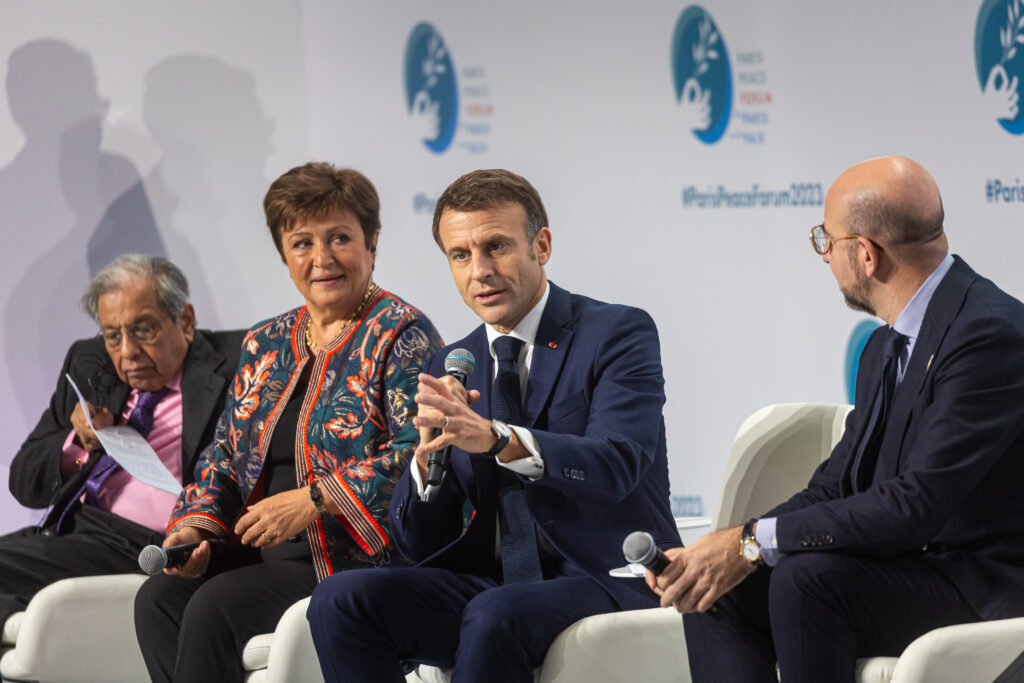
→ The first international summit on glaciers and the poles (One Planet Polar Summit) was held as part of the Paris Peace Forum (November 8-10). With a scientific and climate focus, this summit – a key example of the effort to “Seek Common Ground in a World of Rivalry” – saw the presentation of the first scientific report on the cryosphere and the adoption of the Paris Call for Glaciers and Poles.
→ The preparatory work on the Coal Coalition, which will be officially launched at COP28 in Dubai to phase out private funding for coal-fired power plants currently responsible for a large part of global CO2 emissions.
→ The release of the results of the “Overshoot Commission” initiated in 2022 by the Paris Peace Forum. This commission, headed by Pascal Lamy and made up of 12 leading figures from around the world, formulated new recommendations for tackling global warming: gradual and differentiated phase-out of fossil fuels, negative net emissions from rich countries, financing mechanisms, and adaptation policies (including replication of the JET-P model, a global climate vulnerability index, a moratorium on the deployment of solar geoengineering for intensified research in this field, a framework for carbon capture, sequestration mechanisms, etc.)
→ The preparatory work on the “Global Council on Transition Minerals” which, building on the work carried out by the Forum since its 2022 edition (“Acting Together for a Responsible Transition Minerals Sector”), aims to defend humanity’s collective interest in the production of minerals critical to the ecological transition, without reproducing negative externalities (geopolitical, social and environmental) observed in the oil and gas sector.
→ The launch session of the Call for multi-stakeholder mobilization for sustainable agricultural development in Africa through the transformation of its farming systems, not only to increase production, but also to enable sustainable and equitable food systems that generate wealth for all and prioritize access to nutritious food, environmental sustainability, and resilience.
→ The preparatory session for the work of the Paris Peace Forum on the interaction between Climate and Health, around Mia Mottley, Prime Minister of Barbados, an initiative that complements the Forum’s work on sharing health data and its North-South benefits as part of the negotiation of a pandemic treaty to be adopted in the Spring of 2024.
→ Workshops on the continued preservation of outer space, in particular the Net Zero Space Initiative and questions surrounding space traffic and the rules applicable to the use of the moon, notably around the Lunar Policy Platform.
→ On the challenges of artificial intelligence, the “Global Tech Thinkers” group (academics and experts engaged in digital issues from all over the world) once again met with French President Emmanuel Macron, as they did for the 2021 and 2022 editions of the Forum, to formulate recommendations and attend a dinner extended to companies and institutions.
The high-level session on AI brought together some of the key players in the debate (Brad Smith, Chairman of Microsoft; Yann Le Cun, Chief AI Scientist at Meta; Chen Qiufan, science fiction author; Gabriela Ramos, UNESCO; Zeynep Tüfekçi, technosociologist; and Ian Bremmer, head of Eurasia Group and advisor on AI at the UN).

→ The launch of the Paris Charter on AI and journalism by Reporters Without Borders (RSF) with 10 ethical principles to guide the use of artificial intelligence by newsrooms. The charter was drawn up with 20 key partners and a 31-member international committee. its message: “Humans above machines”, as summarized by Maria Ressa, Nobel Peace Prize 2021.
→ A primary review of the new developments for the Children Online Protection Lab, launched at the 2022 Forum, which put several solutions provided by companies and NGOs to the test in the past year. Organized around Ambassador for Digital Affairs Henri Verdier, and enriched by new supporters, the laboratory adopted a new theme for its 2024 experiments, dedicated to the fight against cyber harassment in all its forms, particularly “revenge porn” at a time when images generated by artificial intelligence are multiplying on social networks.
→ The 5th Christchurch Call Leaders’ Summit around the Special Envoy and former Prime Minister of New Zealand, Dame Jacinda Ardern, and the President of the French Republic, who were joined by a group of world leaders, online service companies, and other organizations to continue the work started in 2019 to eliminate terrorist and violent extremist content online. At the summit, 17 countries, the European Commission, and eight companies providing online services adopted this commitment.
→ A session on the Paris Call for Trust and Security in Cyberspace, which is continuing its normative work with aims to agree to a text regulating the use of cyber-mercenaries by 2024 (read the latest Paris Call report: “Taming the cyber-mercenary market: A multi-stakeholder roadmap for greater transparency and cyberstability”, as well as the report “Protecting critical infrastructures from systemic damage: A way forward to overcome national divergences?”). During the plenary session, INTERPOL Secretary General Jurgen Stock announced that the organization was joining the coalition, marking the first time since its launch five years ago that the Paris Call is supported by an international organization.
→ Third summit for Information and Democracy on the theme “Cooperating for the integrity of information“. In the presence of Minister Catherine Colonna, the Summit gave decisive impetus to two major projects: the evaluation of information space in times of conflict, and international cooperation for a democratic information space. The event was part of the French government’s États Généraux de l’Information.
Each year, ten of the Forum’s showcased projects are selected for the Scale-up Program (SCUP). This cohort is provided with customized, transformational support from the Forum for the following year.
The SCUP is an accelerator that mobilizes resources from within the Forum’s Secretariat and our world-class community of mentors to help strengthen and grow these solutions and amplify their impact. It helps project leaders identify and approach new partners and funders, reach out to new actors and gain visibility, influence positive change in their ecosystem, and strengthen their organizational development.
Discover the 10 projects chosen this year below:
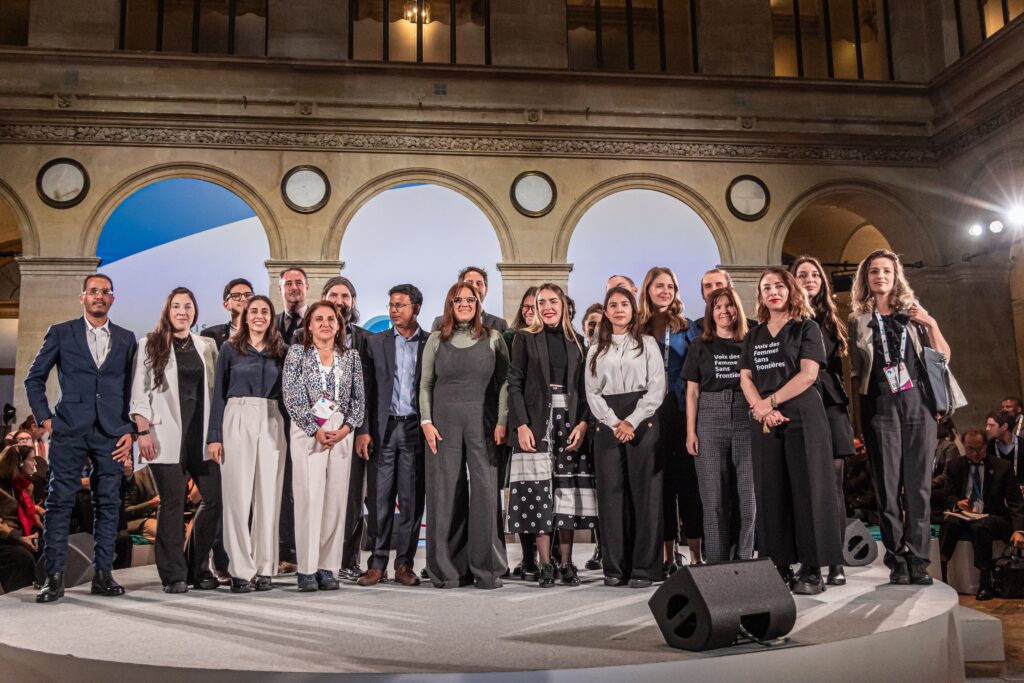
Connecting the Global South with AST-GS1
Astralintu’s equatorial ground station, AST-GS1, serves as a reliable communication bridge between satellites and end-users. It empowers emerging countries and supports outer space sustainability.
An Inclusive Approach to the Space Economy
Space tech enables modern life: communication, navigation, and Earth observation. Caelus Foundation partners with nations to ensure space tech benefits the public in an inclusive manner.
This project’s Common Mechanism is a new, affordable, and accessible global screening tool for gene synthesis to ensure that the building blocks for pathogens do not get into the wrong hands.
Agriculture Collectives of Marginalized Women
Agriculture Collectives of Marginalized Women supports a transformative approach in small holder farming through pooling of land, labor, and capital to overcome barriers to intensification.
Through the promotion of sport, individual and collective development, and discipline, “Knockout: do not give up” aims to support the successful social reintegration of persons deprived of liberty.
DALIL is an AI-powered platform helping citizens, media workers, and fact-checkers to combat disinformation – streamlining and democratizing content verification.
Using open data to combat corruption
Corruption has a devastating impact on the lives of people around the world. The Open Data Charter collaborates with governments, organisations, and activists to open up data and respond effectively to policy challenges.
Leveraging Data for Human-Centered Policies
The Data to Policy Navigator aids policymakers in integrating data into national policies and decision-making processes. It provides step-by-step guidance and tools for using new data such as citizen science, geospatial data, and AI to accelerate the implementation of SDGs.
The AHJ’s initiative “Women’s Voices Without Borders” develops peace and stabilization of war zones through education, protection and networking actions for women journalists and activists.
Justice for Victims in Ukraine
NHC specializes in the digital preservation of documentation from military zones and post-conflict areas, collecting and securing materials, including special safekeeping of materials/cases.
“The Forum continues to grow and is now attracting several other events to Paris that are taking advantage of the political momentum it created, in turn reinforcing the Forum as a key moment in international governance“
Justin Vaïsse
Founder and Director General of the Paris Peace Forum
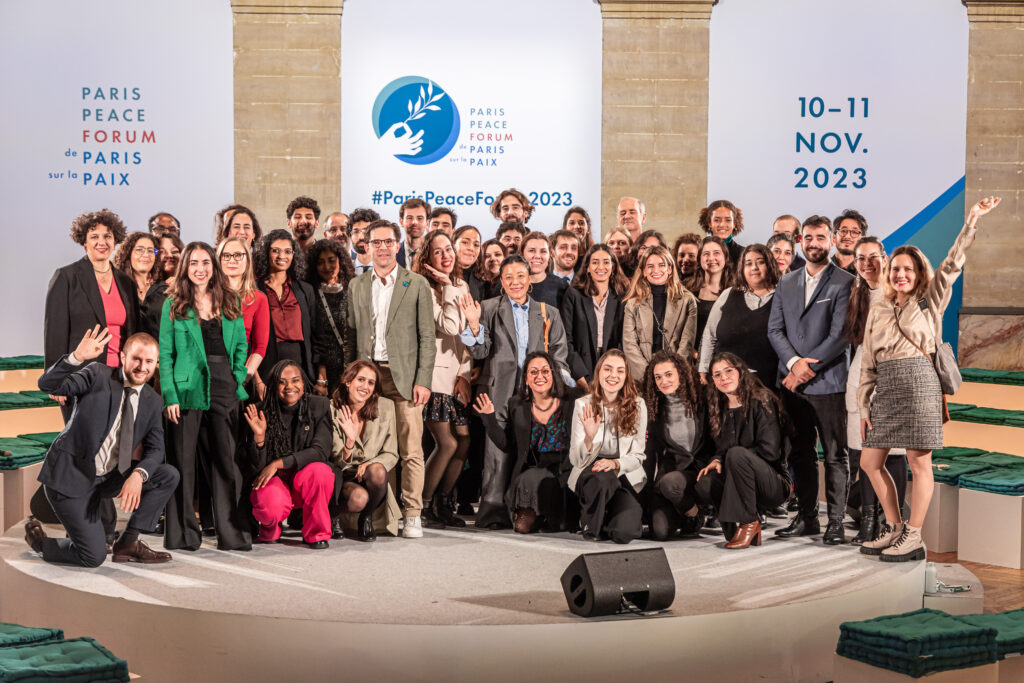
After the annual event, the Paris Peace Forum gets back to its year-round work advancing political initiatives in the fields of the environment and climate, global health, digital technologies and outer space throughout 2024.
The next Forum will be held in November 2024.